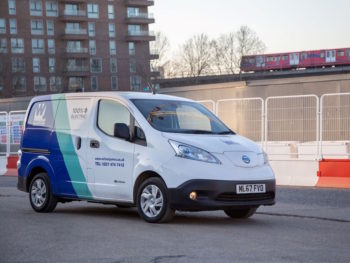The construction industry should embrace the chance to lead the way on initiatives that have a positive impact on community health, especially when they simultaneously drive more efficient ways of working.

So says construction logistics specialist Wilson James as it outlines its support for the introduction of London’s Ultra-Low Emission Zone (ULEZ) but says the construction industry must find more stringent ways of improving air quality in London, including more widespread use of Construction Consolidation Centres.
From next Monday (8th April 2019), the London ULEZ will see non-compliant Euro-6 HGVs have to pay £100 to enter the zone, while non-Euro-6 vans and smaller vehicles will pay £12.50.
Keith Winterflood, director of logistics at Wilson James, said: “Our research shows that a third of construction vehicles delivering to sites in central London’s new ULEZ are not compliant with the tighter exhaust requirements.
“On a typical central London project there are about 300 deliveries daily, so if there are 100 non-compliant vehicles, they will be paying a total of £10,000 in charges per day.”
Whilst Wilson James says Euro level 6 for commercial vehicles is a positive step in reducing particulates, the firm adds that it does not make a significant enough reduction in CO2 emissions and adds that such improvements must be married to other, better ways of working to improve air quality in London.
Winterflood said: “The role of the construction industry is continuing to evolve and change, as supply chains become more complex and solutions become more integrated. Responsibility for our communities is also becoming more widely shared. Presented with an opportunity to take a more expansive view on wellbeing, our industry should be leaping at the chance to lead the way.”
He added: “There is a complementary way to promote clean air: better organisation of construction deliveries. Instead of having thousands of LGVs and HGVs making discreet deliveries to numerous sites, why not consolidate those deliveries on the outskirts of the city and use fewer vehicles to deliver to multiple sites? These facilities (Construction Consolidation Centres, or CCCs), together with the associated technology required to run them, already exist and yet a minority of projects are using them.
“The City of London Corporation has already showed leadership, making the use of consolidation centres during construction a condition of planning for some developments. If cleaner air is a real priority, making this practice more widespread cannot happen too soon.”
The comments follow TfL research that found the implementation of the London Construction Consolidation Centre (LCCC) demonstrated the number of vehicles travelling directly to the construction site reduced by 68%.” A report produced by WRAP also showed that as a direct result of the reduction in vehicles there was a reduction of CO2 emissions of c.75%.
Wilson James has also been actively trying to drive down emissions through cleaner vehicles; the firm recently announced that it’s added the first fully electric vehicle to its London fleet, operating out of the London Construction Consolidation Centre (LCCC).
The addition of the Nissan e-NV200 follows the achievement of a fully Euro 6-compliant vehicle fleet at the LCCC, ranging across sizes and weight up to 26 tonnes, just three years after the Euro 6 standard was introduced.
In addition to the LCCC, Wilson James has pioneered electric vehicles on client sites, most notably at Heathrow Airport in the role of Heathrow Logistic Integrator. The entire fleet of escort vehicles managed by Wilson James at the airport is now electric.
The firm’s work on ensuring a more sustainable fleet has already seen it achieve Gold Standard certification in the voluntary FORS scheme, as well as multiple industry awards and shortlistings.

